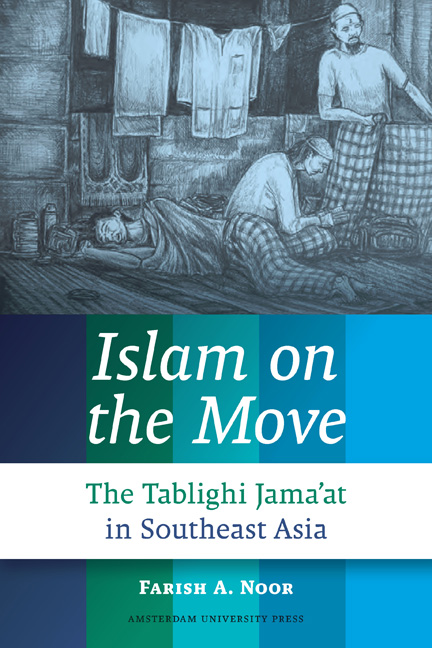Book contents
- Frontmatter
- Dedication
- Contents
- A Note on Proper Names and the Spelling Used in This Book
- Glossary
- Introduction: Brother Bismillah and My Introduction to the Tablighi Jama’at
- I At Home Across the Sea: The Arrival of the Tablighi Jama’at and Its Spread Across Southeast Asia
- II Learning to Be: The Foundational Literature of the Tablighi Jama’at and Its Role in Defining the Movement
- III Learning on the March: The Portable, Reader-friendly Literature of the Tablighi Jama’at and Its Role in the Self-identification and Reproduction of the Movement
- IV The Stories We Tell: The Conversion Narratives of the Tablighi Jama’at and the Internalisation of Tablighi Identity
- V Learning to Be Tablighi: The Rule-governed World of the Tablighi and the Disciplining of the Self
- VI How We Look and What We Are: The Tablighi Jama’at Framed in the Eyes of Others
- VII Finally, a Summing Up: The Tablighi Jama’at as the Complex Thing That It Is
- Notes
- Bibliography
- Index
II - Learning to Be: The Foundational Literature of the Tablighi Jama’at and Its Role in Defining the Movement
Published online by Cambridge University Press: 14 January 2021
- Frontmatter
- Dedication
- Contents
- A Note on Proper Names and the Spelling Used in This Book
- Glossary
- Introduction: Brother Bismillah and My Introduction to the Tablighi Jama’at
- I At Home Across the Sea: The Arrival of the Tablighi Jama’at and Its Spread Across Southeast Asia
- II Learning to Be: The Foundational Literature of the Tablighi Jama’at and Its Role in Defining the Movement
- III Learning on the March: The Portable, Reader-friendly Literature of the Tablighi Jama’at and Its Role in the Self-identification and Reproduction of the Movement
- IV The Stories We Tell: The Conversion Narratives of the Tablighi Jama’at and the Internalisation of Tablighi Identity
- V Learning to Be Tablighi: The Rule-governed World of the Tablighi and the Disciplining of the Self
- VI How We Look and What We Are: The Tablighi Jama’at Framed in the Eyes of Others
- VII Finally, a Summing Up: The Tablighi Jama’at as the Complex Thing That It Is
- Notes
- Bibliography
- Index
Summary
Though it is generally believed that there is a great diversity of opinions in the volumes and the varieties of controversies the world is distracted with, yet the most I can find that the contending learned men of different parties do, in their arguings one with another, is, that they speak different languages.
John LockeIn writing on and about the Tablighi Jama’at, I am already assuming that there is a thing to be studied, and that the signifier Tablighi Jama’at signifies a thing that is distinct and identifiable.
Scholars of the Tablighi are, of course, cognisant of the fact that they are discussing a mass movement that is made up of many individual subjectivities, and no scholar seriously believes that even the most detailed study of such a movement can account for the millions of subjectivities that make up the rank and file of such a complex entity. No matter how deep we delve into the micro-histories and micro-biographies of such a movement, we cannot hope to account for it in all its totality. Nor should we assume that any claims of knowledge we make of such movements can ever be exhaustive or final.
Nonetheless we are left with the challenge of describing what this mass movement is, and to forward certain opinions and observations about its character, worldview, long-term ambitions and so on. When dealing with such composite entities like mass movements and political parties, scholars are undoubtedly aware of the pitfalls of overgeneralisation and the trap of assuming some sort of homogeneous mindset that is uniform among all the members of such groups. Even at the height of the Cold War and the ‘red scare’, it is doubtful that even the most ardent opponents of the Soviets believed that all communists thought alike; so why should it be any different when we study religiously inspired movements?
Furthermore, as we shall see in the following chapters, it should be noted that the Tablighi Jama’at has not only come under the scrutiny of scholars and academics but also other Muslim schools of thought who have held certain notions, and even apprehensions, about them.
- Type
- Chapter
- Information
- Islam on the MoveThe Tablighi Jama'at in Southeast Asia, pp. 63 - 88Publisher: Amsterdam University PressPrint publication year: 2013



